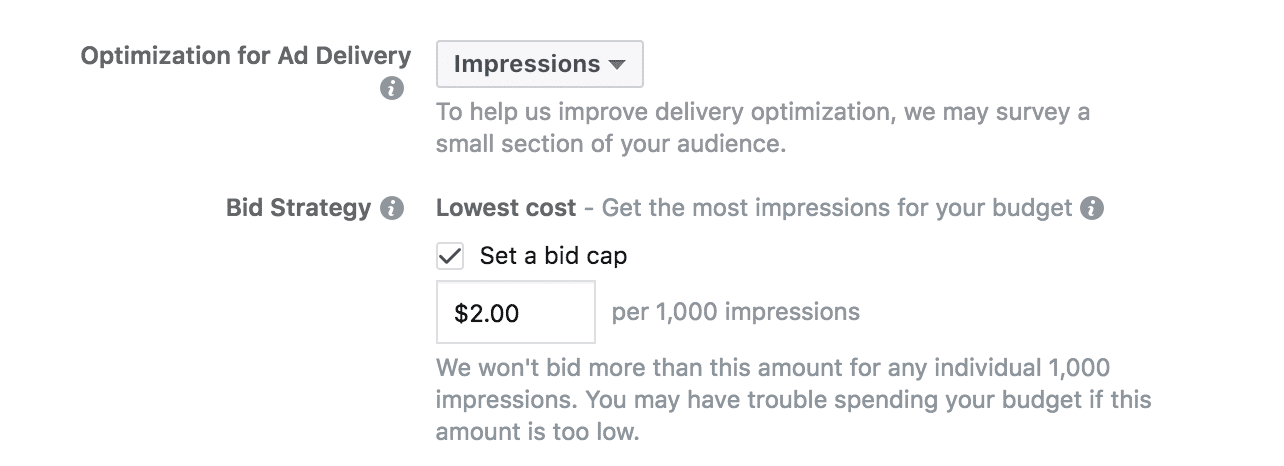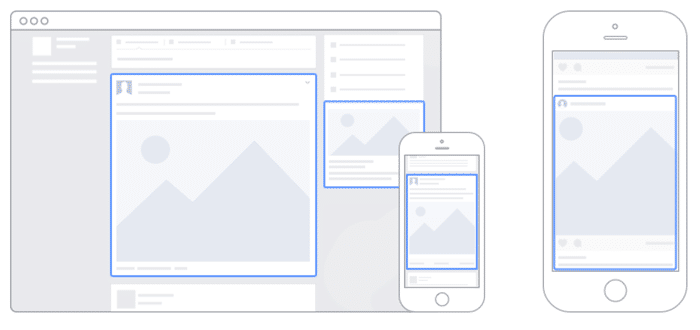This question comes up a lot when we talk to our clients about Facebook advertising.
The short answer is that it costs whatever you want to spend. It can be as little as $1 a day, which is the minimum budget that Facebook will let you set to advertise on their platform.
But that isn’t very helpful in the long run, so we’ve gathered information to help you get an idea about how much it will cost your business to advertise on Facebook, and what factors will determine your overall price.
Facebook Advertising Costs: Averages
There are two options when paying for ads on Facebook: cost per click (CPC) or cost per thousand (CPM). With CPC, you pay each time someone clicks your ad. With CPM, you pay to show your ad to 1,000 people, regardless of how many interact with your ad.
Based on AdEspresso’s most recent data from 2017, the average CPC is $0.26, and the average CPM is $7.19. (The CPC average is from the fourth quarter of 2017, or October to December. The CMP average is from the third quarter of 2017, or July to September.)

AdEspresso has graphs and breakdowns if you want to see information based on country, campaign objective (more on that in a minute), and more.
While these averages can be helpful, the amount that companies spend—and the amount you should spend—varies wildly based on a few important factors. Those factors are largely due to the way that Facebook runs ad campaigns.
How Advertising on Facebook Works
Before we jump into the individual factors that affect the cost of ads on Facebook, let’s get a brief overview of how the system works. Because it’s weird.
Facebook uses a modified auction system where the winner is not necessarily the highest bidder. To determine the winner of the auction (meaning which ad will be shown to a given set of people), Facebook takes three factors into account:
- Your Bid
- Estimated Action Rates
- Ad Quality
Based on these three factors, the ad with the highest score wins, and it is then shown to customers. Then, and only then, does Facebook determine how much to charge the company showing the ad. You can learn more detail about these auctions in Facebook’s Advertiser Help Center.
As we mentioned above, Facebook advertising is a little weird when compared to traditional PPC advertising. Check out this complete guide to advertising on Facebook to learn different strategies that will help you both advertise and convert more users.
How Facebook’s Auction Affects Your Ad Cost
Let’s start by looking at how the three parts of Facebook’s Ad Auction affect your costs.
Bidding Options
To help you manage your ad spend, you set a budget for your campaign. You can set a daily budget or a lifetime budget. Either way, Facebook won’t spend more than the amount you set.
Your budget will determine your total spend, but your bid affects your CPC or CPM.
Your bid is the amount you’re willing to pay to for a click or to show your ad. You can either let Facebook determine bids based on your budget and goals, or you can manually set what you think a specific action is worth to you. (If you want more detail, check out Facebook’s primer on bid strategies.)
So how does your bid amount affect your cost? If you raise your bid, you’ll likely win more auctions and have your ad shown to more people, but it will often raise your CPC or CPM. If you lower your bid, you decrease your odds of winning bids, but your CPC or CPM will usually be lower.

Estimated Action Rates
The next factor that affects your cost is the estimated action rate of your ad. When you run a Facebook campaign, you choose a specific area or action you want to target—like clicks or conversions. Once you’ve chosen the goal of your campaign, Facebook will show your ad to people it believes are more likely to take that action.
Facebook isn’t too forthcoming about how this will affect your cost, but AdEspresso’s data shows that Reach is the most expensive objective at $1.01 per click, offsite conversions come in at $0.37 per click, and link clicks are near the bottom at $0.12 per click.
Ad Quality
You’ll win more auctions and pay less for them if you have a high-quality ad. A high-quality ad is an ad that gets more positive interactions and less negative feedback than other ads.
That means that if you can create an ad that people regularly engage with, you’ll be able to decrease the cost of showing that ad. You can check the quality of your ad through Ad Manager by finding your ad’s relevance score. This will help you determine how your ad is performing. If you can improve your relevance score, you should see your Facebook costs decrease.

Other Factors that Determine Facebook Ad Costs
In addition to the three factors based on Facebook’s auction structure, there are other factors that impact how much you’ll pay for an ad on Facebook.
Audience
Facebook has a lot of ways to narrow down your target audience, including age, gender, zip code, interests, and search history. If the audience that you want to target is in high demand, you’ll end up paying more for your ads that are shown to them. If your audience isn’t being targeted by a lot of other companies, you’ll end up paying less.
Placement
The location of your ad will also affect your CPC or CPM. You can let Facebook decide this for you, or you can manually choose where you want your ad to appear. For Facebook, options include the Newsfeed, right column, and Marketplace. Instagram, Audience Network, and Messenger have their own options.

For each individual platform, the more prominent the ad, the more expensive it is. If you break it down by platform, Instagram is usually the most expensive option, followed by Facebook, followed Audience Network.
Time of Year
More companies tend to advertise during certain times of the year, like the weeks leading up to Black Friday. If you choose to run ads during these times, you’ll have more competition, which means that you’ll likely see your CPC and CPM increase as a result. That doesn’t mean you shouldn’t advertise during popular holidays, but it does mean you’ll have to factor in the increased cost.
Wrapping Up
Facebook’s system is complicated, so it can be difficult to get an idea of what you should be spending on your ad campaign. By thinking through all of the factors that might impact your cost, you can better plan your Facebook strategy.
If you’re looking for help getting started with Facebook ads, setting up a campaign, managing existing ads, or getting the best return on your investment, it might be helpful to partner with a Facebook marketing expert—like us! If your company could benefit from some Facebook expertise, check out our PPC services or contact us. We’d love to talk about how we can save you time and money.

Reader Interactions